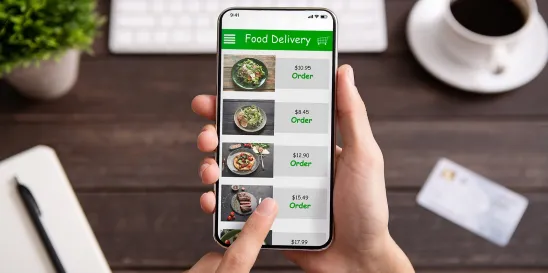New York City has become the first major U.S. city to establish a minimum pay-rate for app-based restaurant delivery workers. The new law goes into effect July 12, 2023.
Popularity of Food Delivery Apps
The rise in popularity of food delivery apps over recent years, driven in part by heightened demand for food delivery during the COVID-19 pandemic, has brought increased attention to food delivery workers and their working conditions.
While delivery workers have expressed concerns about many challenges affecting their livelihoods, including violence on the streets, bike theft, and extreme weather conditions, there is one issue that has remained at the forefront of worker advocacy: pay.
App-based delivery workers are classified as independent contractors, and not employees. They are not entitled to the minimum wage and must pay for their own health insurance and business expenses. Many delivery workers believe that pay below the minimum wage is inadequate, particularly in light of high out-of-pocket expenses for transportation and delivery gear, and they are thus pushing for higher pay.
Ongoing debates among elected officials, delivery app companies, and delivery workers over pay standards for app-based delivery workers led to Local Law 115, passed in 2021. Local Law 115 required the Department of Consumer and Worker Protection (DCWP) to evaluate the pay and working conditions of app-based delivery workers and to set a minimum pay-rate for their work by January 1, 2023. Delivery app companies lobbied against the measure, citing concerns over increased prices, the elimination of jobs, reduced tipping, less flexibility for workers to choose shifts, and a practice known as “multi-apping” (when workers deliver for more than one app at once).
Against the backdrop of corporate lobbying, two camps have emerged: those in support of a minimum pay-rate and those against it.
New Law
On June 11, 2023, New York City Mayor Eric Adams and the DCWP announced a new minimum pay-rate for app-based food delivery workers.
Under new regulations, effective in New York City on July 12, 2023, apps that pay for all the time a worker is connected to the app (i.e., time waiting for trip offers and trip time) must pay at least $17.96 per hour (approximately $0.30 per minute), not including tips. This rate will increase to $19.96 per hour when it is fully phased in on April 1, 2025, with an annual adjustment for inflation. Apps that pay only for trip time (i.e., time from accepting a delivery offer to dropping off the delivery) must pay at least approximately $0.50 per minute of trip time, not including tips.
Apps will have some flexibility under the new rules. They can choose how to pay workers the minimum rate. They can pay delivery workers per trip, per hour worked or, alternatively, develop their own formulas.
Reactions
This new law marks a significant change for the city’s more than 60,000 app-based delivery workers, who currently earn $7.90 per hour on average, according to the city’s news release. However, the reaction to the news has been mixed. Some are championing the change as a major win for delivery workers given that their status as independent contractors has previously excluded them from statutory minimum wage protections. They also say this move reflects an appreciation for the contributions of app-based delivery workers, who have braved the pandemic, extreme weather conditions, and other difficult circumstances to serve New Yorkers.
Representatives of some delivery companies and other critics warn of adverse consequences, such as increased prices and fewer jobs for gig economy workers. One representative even suggested that his company will take legal action to maintain the status quo.
Meanwhile, other stakeholders are dissatisfied for a different reason: they believe the new scheme does not go far enough in protecting workers. According to City Comptroller Brad Lander, “City Hall acquiesced to the lobbying of multibillion-dollar app companies, delaying the raises owed to deliveristas six months ago and setting a sub-minimum-wage standards that pads corporate profits off the backs of some of the hardest workers in our city.” In his statement, Lander explained that delivery workers will continue to earn amounts below the minimum wage when their operating costs are factored in. Those in Lander’s camp refer to the rule as being “watered-down.” Minimum pay-rates as high as $24 per hour were proposed in November 2022.
Despite differences in how the new wage rules are being perceived, there is no question the adoption of these regulations protects workers who work near, at, or below minimum wage. The new law is in line with previous changes in the city, such as the Fair Workweek Law dictating schedule certainty for fast food and retail workers, just cause protections for fast food employees, and requirements for weekly pay and bathroom access for delivery workers. The city appears committed to additional rights for workers.






 />i
/>i

